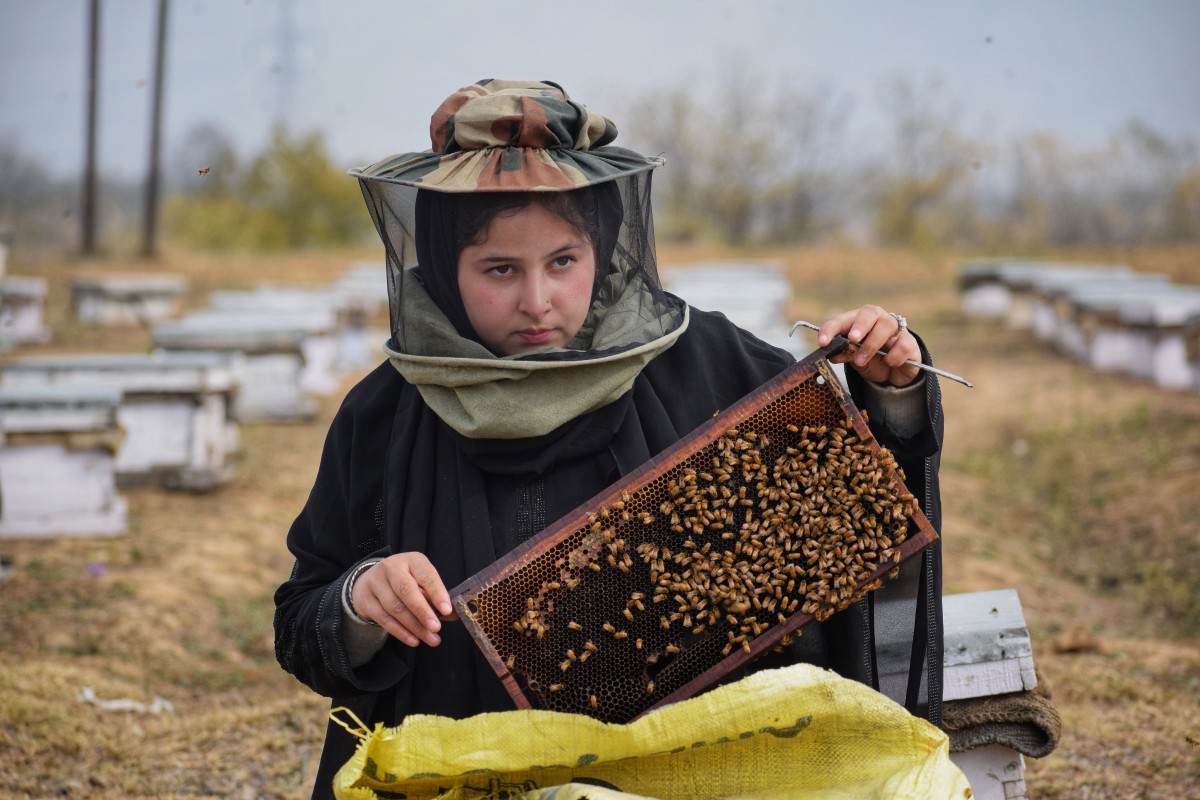In the lush, picturesque valleys of Kashmir, where snow-capped mountains kiss the skies and sprawling fields of saffron bloom in the autumn, tradition has often kept women confined to the domestic sphere.
Sania, Kashmir’s first female beekeeper, has not only defied societal norms but is also working tirelessly to uplift local farmers and create a sustainable future for her community.
But in the midst of this conservative backdrop, Sania Zehra a 20 year resident of Balhama, is buzzing with change—literally and metaphorically. Sania, Kashmir’s first female beekeeper, has not only defied societal norms but is also working tirelessly to uplift local farmers and create a sustainable future for her community.
The beginning of Sania’s dream
Born and raised in Kashmir, Sania always had a deep connection to nature. Growing up in a family with a small farm, she spent her childhood among the lush gardens and orchards, watching her father carefully tend to his bees. However, despite the family’s beekeeping background, beekeeping was always seen as a male-dominated industry, one that was far from the grasp of women in her community. Sania had no intention of conforming to these stereotypes.
‘I’ve always believed that nature is the best teacher. I would watch my father’s work with their hives, but I never thought I could do it myself—until one day, something changed,’ Sania recalls.
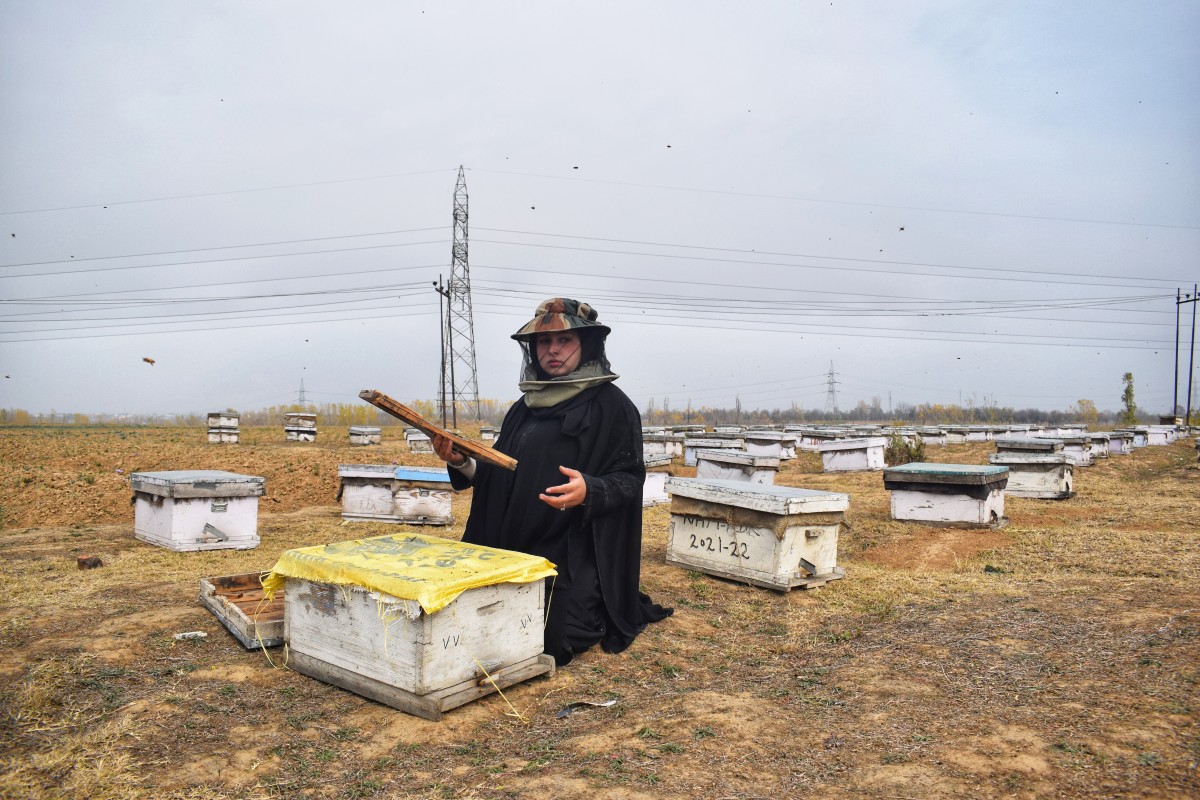
In 2023, after completing her 12th standard, she start pursuing Islamic studies and then also Sania decided to pursue her passion for beekeeping. Armed with a vision to change the narrative and a determination to succeed, she started researching and learning everything she could about the craft.
‘Beekeeping,‘ she says, ‘is not just about honey. It’s about pollination, the lifeblood of farming, and the key to a healthy ecosystem. I knew it was something I could bring to my community.’
Breaking through the barrier
Sania’s first challenge was the skepticism she faced from her own community. It wasn’t easy. She had to fight against a deeply ingrained mindset that women should stay away from physically demanding jobs like beekeeping, which is often seen as dangerous and labor-intensive.
But Sania was undeterred. She found a mentor in a seasoned beekeeper from the region and slowly began to master the art of managing bee colonies. Soon, she took the bold step of establishing her own apiary on her family farm. What started as a small initiative soon blossomed into a full-fledged business. She has more than 650 colonies.
In the initial years, her efforts were met with challenges – from bee stings to unfavorable weather conditions, but Sania remained undeterred.
In the initial years, her efforts were met with challenges – from bee stings to unfavorable weather conditions, but Sania remained undeterred. Her persistence paid off when she successfully harvested her first batch of honey. The smooth, golden nectar was a triumph—not just of her hard work, but of her ability to defy the odds.
What made Sania’s beekeeping venture stand out was not only her personal success but the impact she had on the community. Realising that beekeeping could be a lucrative and environmentally friendly practice, Sania began to educate and motivate local farmers, many of whom were struggling with declining crop yields due to poor pollination.
Sania overcoming cultural barriers
One of Sania’s biggest triumphs was changing the mindset of her community. She didn’t just teach people how to beekeep; she proved that women, too, could hold influential roles in the agricultural sector. In a society where women are often relegated to domestic spaces, Sania’s success became a beacon for other women who wished to venture into farming, business, and even other traditionally male-dominated fields.
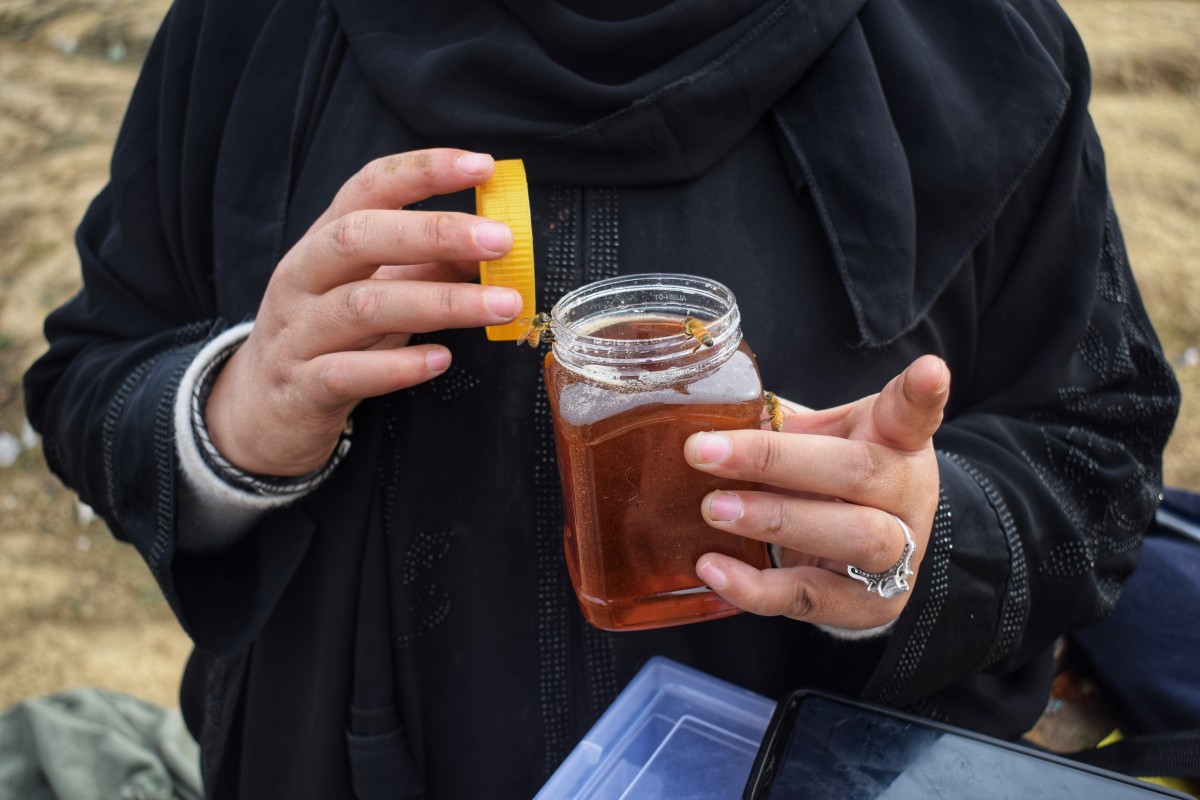
Today, several women from rural areas have joined her initiative, setting up their own small sheep farms,poultry farms and some women are setting there fruit or vegetables gardens for earning. ‘I feel proud to see other women getting involved,‘ says Sania, her eyes shining with a sense of accomplishment. ‘We’re showing the world that women can be leaders, innovators, and changemakers.’
Sania, now a successful businesswoman, understood the power of hard work and determination. But the truth was, her success wasn’t something most young Kashmiris could easily replicate. Beekeeping required patience, knowledge, and resources—things that many young people simply didn’t have. And though agriculture was the lifeblood of the region, the challenges facing the farming community were immense: from unpredictable weather patterns to the lack of modern training and infrastructure.
Islamic perspective of beekeeping business
Sania while interacting with Feminism In India said, ‘Beekeeping is mentioned in the Quran; it carries great blessings from Allah. It doesn’t matter that I am a girl; what matters is the capability to work. Personally, I believe that beekeeping is a respectable profession and also has healing properties.’
Sania stated that not only does she earn money, but her beekeeping business has also allowed her to expand into other ventures.
She said in Kashmir it’s not easy to do that kind of business which is male dominated: ‘I faced a lot of trolling at the start, even from close relatives, but now, I never lost heart. I always tried my best to focus on my work, and today I am genuinely satisfied.’
Sania stated that not only does she earn money, but her beekeeping business has also allowed her to expand into other ventures. ‘I produce beauty products and even green pollen from beekeeping.‘
Sania buzzed Into Bollywood and Dubai
It began one sunny afternoon when Sania received an unexpected message. It was an actress from a Bollywood production house, inquiring about her honey: ‘I have heard a lot about your honey.’
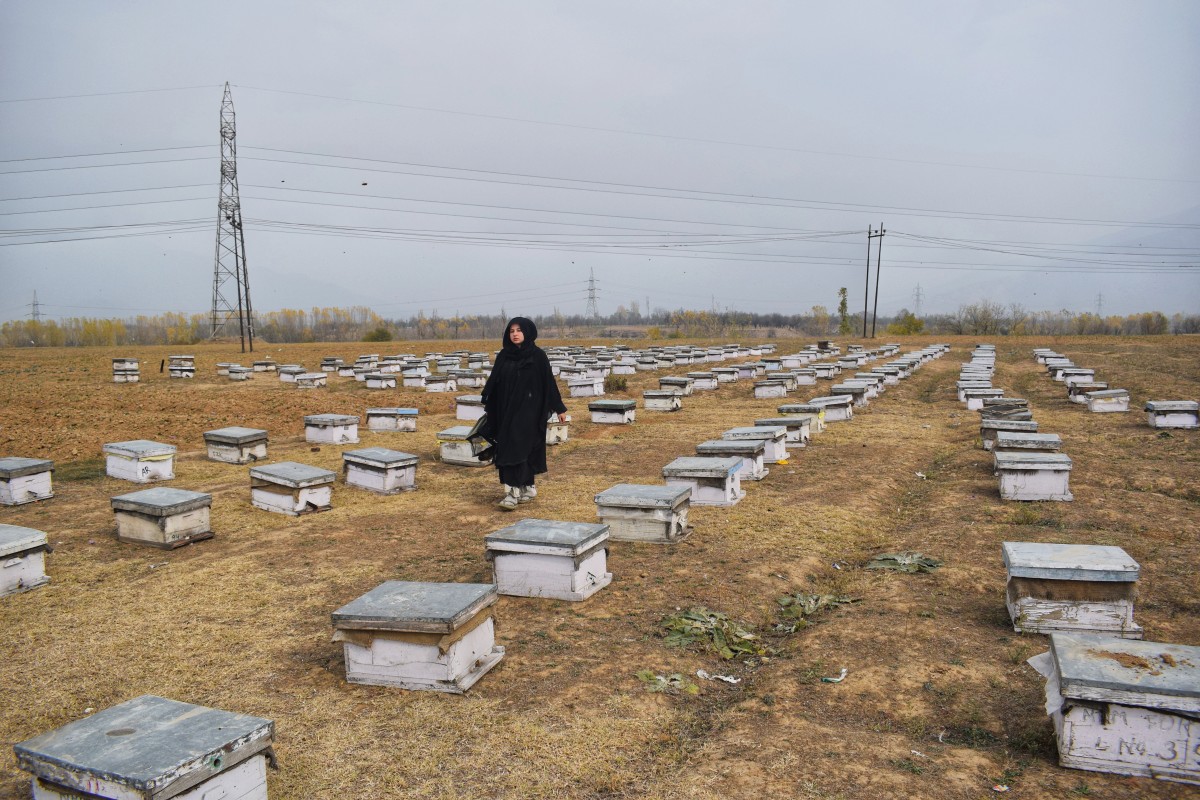
Sania was stunned. She had never imagined that her small-scale operation would catch the attention of India’s film capital. But the excitement didn’t stop there. Shortly after the Bollywood success, another call came, this time from Dubai and Pakistan. The news spread quickly across media channels, and soon, Sania’s phone was ringing nonstop. ‘People from all over the country are calling, asking for honey‘.
‘I never imagined this would happen,’ Sania said in a reflection, standing amidst the hives in her orchard one afternoon. ‘But sometimes, nature has a way of surprising you. I’m just grateful that the world is finally discovering the sweetness of Kashmir.’
And with that, Sania Zehra’s honey was no longer just a local treasure—it was an international sensation, buzzing all the way from Bollywood to Dubai.
A beekeeper’s cry for Kashmir’s future
Sania Zehra stood quietly in the heart of her orchard, watching the bees drift . The gentle hum of their wings was a soothing sound, but today, her mind was elsewhere. As Kashmir’s first female beekeeper, she had spent year building her small business, and carving out a space for herself in a world that often seemed closed off to women.
As Kashmir’s first female beekeeper, she had spent year building her small business, and carving out a space for herself in a world that often seemed closed off to women.
‘You all know what we’re up against,’ she began, her voice firm yet compassionate. ‘Unemployment here is at an all-time high. Every day, our young people are leaving to search for work in other cities, and many are giving up on the land they’ve known their whole lives. But it doesn’t have to be this way.’
She paused, taking a breath as she glanced at the group. Her eyes were filled with a deep sense of responsibility, but also hope.
Her words were met with a hesitant silence, but deep down, Sania knew that change would not come overnight. It would take time, effort, and most of all, collaboration. But she was determined to do her part.
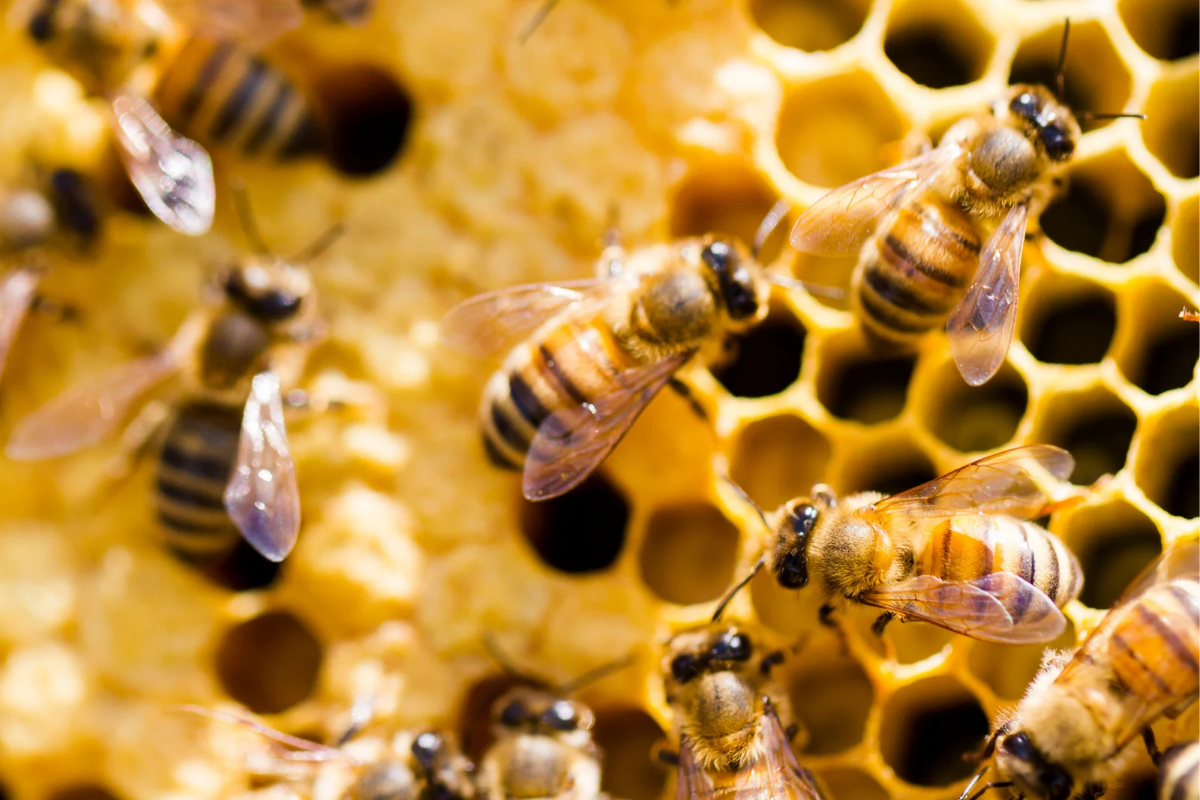
‘The youth here are hungry for change,’ she thought. ‘They just need a chance to build something of their own. Beekeeping, agriculture, eco-tourism—these are just a few of the areas where they can thrive. We have to show them that staying here, working here, can be just as fulfilling as moving away.’
As the days passed, Sania will expand her beekeeping venture, not just as a business, but as a platform for training and education. She began offering workshops for young people in Kashmir, teaching them the basics of beekeeping, sustainable farming, and entrepreneurship. Her goal was simple: to equip them with skills that could help them create their own jobs, right where they lived.
Slowly, she saw a shift. More and more young people, particularly women, began to join her workshops, learning how to set up their own hives, harvest honey, and sell it locally. Some even took the initiative to start small businesses of their own, selling honey-based products and promoting the region’s rich agricultural heritage.
For Sania, the bees were not just a business they were a symbol of resilience, a reminder that even in the face of adversity, life could bloom again.
For Sania, the bees were not just a business they were a symbol of resilience, a reminder that even in the face of adversity, life could bloom again. And for the youth of Kashmir, they were a call to stay, to build, and to create a future they could be proud of.
The lasting legacy of Sania’s work
Sania Zehra’s journey from a curious young woman to Kashmir’s first female beekeeper stands as a testament to the power of perseverance, education, and the ability to break through societal barriers. In a region that has witnessed years of conflict and hardship, her success is a refreshing reminder of the transformative power of hope, hard work, and the resilience of the human spirit.
As for the bees? They continue to buzz through the fields of Kashmir, quietly playing their part in a revolution that is changing the face of farming in the valley, one hive at a time.
